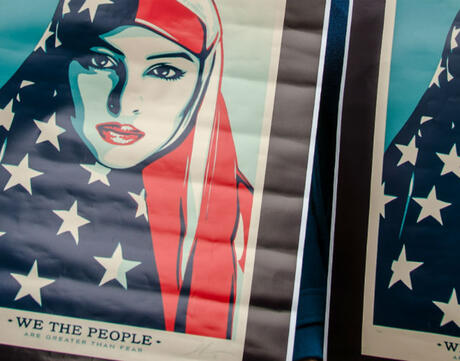
Student Essay: Wrong in My Own Skin
“I am going to shoot all the Muslim kids.” My vision blurred as the principal held up a picture of the graffiti from my high school bathroom. Numbing shock burned through my body as memories flashed through my head. I remembered the Muslim Ban.
I remembered the video my karate teacher posted on Facebook about Sharia law taking over. I remembered the man at my debate convention yelling that Islam encourages violence. I remembered the Interfaith event I went to where someone asked, “How can we help Muslims fight ISIS?” I remembered feeling anxiety and shame before reciting my poem about the way society has made me feel wrong in my own skin. I felt the familiar heart wrenching pain of not belonging and the queasy shock of being confronted with the hate in my community.
As Co-President of Muslim Student Association, my principal called me in to ask what the school should do to address the hate crime. But where does one even begin to address hate? How can we show people that Muslims are not that different? These questions weighed down on me, so I decided to talk to my English teacher, one of the most intelligent and articulate individuals I have ever met. Despite our vastly different upbringings, we share a love for civic engagement and activism. After discussing, we decided a good way to approach this issue was through educational dialogue. Over the weekend, my teacher found articles about stereotyping Muslims. My Co-President and I reviewed these articles and decided to present this issue to teachers at a Principal’s Cabinet meeting. We urged teachers to build a discussion around the hate crime and set a standard of tolerance in their classroom.
Afterwards, we started creating dialogue around stereotypes in my English class. My teacher’s focus question was “How would you identify someone as Muslim?” Reluctant hands went up when she asked “Do you think someone with darker skin is probably Muslim?” and “Do you assume Muslims are mostly from the Middle East?”
After people talked about their bias and realized how unfounded it was, they could better understand the impact of the hate crime at our school.
Seeing that people cared to listen gave me a surge of hope. I felt tears of joy start to pool in my eyes because I had never before been comfortable with discussing my Muslim identity. I felt empowerment coursing through my veins as I talked to teachers, admin, and peers about the realities Muslims face everyday in America. This experience made me realize that my identity is a valuable part of the fabric of our nation. In America, we often take our diversity for granted. Instead, we need to grow our desire for understanding and acceptance. As our communities become more diverse, we must pull upon our past of fighting for freedom and continue to uphold the fundamental idea that “all men are created equal.”

